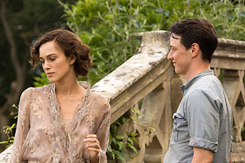When Ian McEwan first published his acclaimed novel, Atonement, in 2001, critics praised it for its wide usage of metafiction and its deep exploration of psychological realism; for delving deeper into the minds of its characters than novels usually do, and using characters’ innermost thoughts for the progress of its story and to help readers understand situations presented in their entirety.
Atonement Initially Impossible for Film Adaptation
The book is highly innate as McEwan explores the minds of 13-year-old Briony Tallis (Saoirse Ronan), her older sister, Cecilia (Keira Knightley), and their housekeeper’s son, Robbie Turner (James McAvoy), on a hot summer’s day in 1935, England.
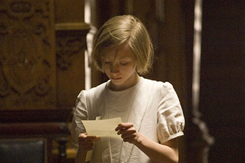 Cecilia and Robbie have developed feelings for each other but are keeping mum about it. In the eyes of immature and uninformed Briony, however, her sister is in danger of a sex maniac’s advances.
Cecilia and Robbie have developed feelings for each other but are keeping mum about it. In the eyes of immature and uninformed Briony, however, her sister is in danger of a sex maniac’s advances.
When their cousin staying at the house is raped, Briony steps forward with a lie that forever alters the lives of all three of them. And as the 1940 Battle of Dunkirk ends and the Dunkirk Evaluation takes place, the three will find that hope for a blissful and peaceful resolution in their relationship with one another becomes less possible.
There’s so much more than meets the eye in this novel; so much going on within the characters – thoughts and feelings – that translating the book onto the screen is by itself a tremendous challenge.
Wright And Hampton’s Failure
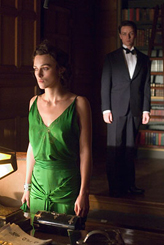 It’s no wonder then that British director Joe Wright and screenwriter Christopher Hampton’s film adaptation – though a brave and commendable effort – fails to bring justice to the depth that McEwan intricately creates in his novel. One can’t understand fully the hostility between Cecilia and Robbie despite their affection for each other, the awkwardness between the two when they meet for tea, and Briony’s series of unaccountable irrational actions based solely on the film.
It’s no wonder then that British director Joe Wright and screenwriter Christopher Hampton’s film adaptation – though a brave and commendable effort – fails to bring justice to the depth that McEwan intricately creates in his novel. One can’t understand fully the hostility between Cecilia and Robbie despite their affection for each other, the awkwardness between the two when they meet for tea, and Briony’s series of unaccountable irrational actions based solely on the film.
On top of that, the film is too urgently paced, so much that character development is hardly given sufficient time for. It couldn’t hurt much to add 10 more minutes’ worth of storyline from the book into the beginning of the film, especially since the final product is already visually stimulating. That’s probably the saddest part about Atonement; that audiences don’t get to comprehend its characters properly.
Marvelous Technical Elements
But all these are made up for with the film’s spectacular display of technical aspects. Artistically, Atonement is easily one of the most beautifully crafted films of the year 2007 with reference to US release dates. For Singapore, the film is a fabulous way to open a new year of promising hits in cinema.
 Wright is an astounding director and proves, like he did with his 2006 Pride & Prejudice, that when it comes to literary or period pieces, he knows exactly what he’s doing.
Wright is an astounding director and proves, like he did with his 2006 Pride & Prejudice, that when it comes to literary or period pieces, he knows exactly what he’s doing.
With Atonement, he plays with and brings audiences back and forth in time, presenting the different perspectives of the rape – Briony’s illusion and Robbie’s truth – giving more weight to the storyline, and overall making the piece a fascinating one to inhale. Wright hits the nail on the important elements and parts of the novel, drawing attention and focus to individual characters through a marvelous play of lighting.
Magnificent visuals are aplenty in Atonement, from Sarah Greenwood’s elaborate and intricate art direction of the Tallis’ majestic England estate and the site for war-torn Dunkirk, Jacqueline Durran’s timeless costume pieces, to Seamus McGarvey’s seamlessly designed camerawork and cinematography, significantly the 5-minute single shot through the Dunkirk Evacuation site.
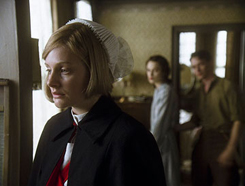 But it’s Dario Marianelli’s exquisite score that’s the most powerful technical element in the film, with its infusion of the striking of typewriter keys with wildly romantic tunes as well as melancholic moments Through his various frequencies of the beats from the typewriter, adjusted according to the dramatic requirement of each scene, Marianelli shows a clear understanding of the danger of words and writing in this story and the impact it has on the lives of its characters. His intelligent use of sound elements in the film itself, which leads on to become a part of his score, is most impressive; like the pulse from Brenda Blethyn’s beating of a police car with an umbrella that continues to sound as part of – and fade into – the background musical score despite the switch of camera shots.
But it’s Dario Marianelli’s exquisite score that’s the most powerful technical element in the film, with its infusion of the striking of typewriter keys with wildly romantic tunes as well as melancholic moments Through his various frequencies of the beats from the typewriter, adjusted according to the dramatic requirement of each scene, Marianelli shows a clear understanding of the danger of words and writing in this story and the impact it has on the lives of its characters. His intelligent use of sound elements in the film itself, which leads on to become a part of his score, is most impressive; like the pulse from Brenda Blethyn’s beating of a police car with an umbrella that continues to sound as part of – and fade into – the background musical score despite the switch of camera shots.
With Cold Mountain’s love and war theme, Gosford Park’s dark degree of mystery, Atonement brings you on an emotional journey that is somewhat overwhelming and yet entertaining.
The Powerhouse Cast
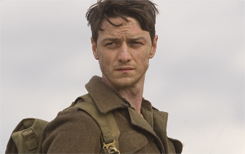 Along with the skillfully crafted technical aspects is a stupendous cast that is a delight to watch. Considering that the depth of the novel is in its characters, it is the actors in Atonement who are presented with the greatest challenge, and they come through quite remarkably.
Along with the skillfully crafted technical aspects is a stupendous cast that is a delight to watch. Considering that the depth of the novel is in its characters, it is the actors in Atonement who are presented with the greatest challenge, and they come through quite remarkably.
McAvoy gives easily the best performance of his career thus far, significantly during his witnessing of horrific war or postwar scenes and in the 5-minute single shot of his walk down war-torn Dunkirk. Although more screen time and a deeper exploration of his characters tribulation on Hampton’s part would have helped the actor along more and bestowed upon the audience a greater sense of satisfaction and understanding of Robbie, it’s a generally clean, beautiful performance.
 Knightley brings the flamboyance of Elizabeth Bennet in her 2006 Oscar-nominated Pride & Prejudice performance into yet another female character in love and whose feelings for the household’s gardener is constantly questioned from a third persons point of view, or at least in that of her 13-year old sister.
Knightley brings the flamboyance of Elizabeth Bennet in her 2006 Oscar-nominated Pride & Prejudice performance into yet another female character in love and whose feelings for the household’s gardener is constantly questioned from a third persons point of view, or at least in that of her 13-year old sister.
But Knightley doesn’t shine as much as she did in her previous collaboration with Wright, simply because this is not a story about Cecilia, but rather, about Briony, played by 3 gleaming actresses – Ronan, Romola Garai (Briony age 18) and Vanessa Redgrave (Briony age 77).
Redgrave is captivating in her 2-minute single shot near the end and Garai tackles the consequences of her character’s childish lie and the guilty-conscience of Briony quite spectacularly.
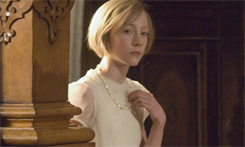 But it’s Ronan who’s arguably the best performer of the lot (she was, after all, the only cast member who nabbed an Oscar nomination this year), portraying brilliantly the complicated role of a naïve child who appears to be intelligent but is in actual fact not. There’s always something captivating about a spoilt child character who thinks she knows everything. But Briony holds more than that. She takes matters into her own hands and irritates you with a huge degree of dangerous ignorance. Ronan is able to understand and capture that important essence of Briony; the essence which defines – and thus plays a humungous role in establishing – the plot of the film. It’s a heavy responsibility for a 12-year-old (Ronan was 12 at the time of filming) yet such an intelligent portrayal as a result, especially so for a child actor playing an older character and who delivers a performance way ahead of her years
But it’s Ronan who’s arguably the best performer of the lot (she was, after all, the only cast member who nabbed an Oscar nomination this year), portraying brilliantly the complicated role of a naïve child who appears to be intelligent but is in actual fact not. There’s always something captivating about a spoilt child character who thinks she knows everything. But Briony holds more than that. She takes matters into her own hands and irritates you with a huge degree of dangerous ignorance. Ronan is able to understand and capture that important essence of Briony; the essence which defines – and thus plays a humungous role in establishing – the plot of the film. It’s a heavy responsibility for a 12-year-old (Ronan was 12 at the time of filming) yet such an intelligent portrayal as a result, especially so for a child actor playing an older character and who delivers a performance way ahead of her years
A Cinematic Breakthrough
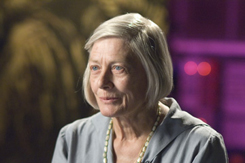 Atonement is nominated for 7 Oscars at the 80th Annual Academy Awards this year. Along with Supporting Actress for Ronan, the film is also up for the coveted Best Picture prize, cinematography, costume design, original score, art direction and adapted screenplay for Hampton. The film was also selected to open the 2007 Venice International Film Festival and the 2007 Vancouver International Film Festival.
Atonement is nominated for 7 Oscars at the 80th Annual Academy Awards this year. Along with Supporting Actress for Ronan, the film is also up for the coveted Best Picture prize, cinematography, costume design, original score, art direction and adapted screenplay for Hampton. The film was also selected to open the 2007 Venice International Film Festival and the 2007 Vancouver International Film Festival.
The trailer, however, was much better, with promising elements of an epic, tear-jerking piece. Nevertheless, for a film adaptation of a book that is as difficult to translate to the screen as Atonement was said to be, Joe Wright blurs the lines between what can and cannot be made for the screen and proves that the power of the movies meets no boundaries.
UrbanWire gives Atonement 4.5 out of 5 stars
Movie Details:
Opens: Jan 24
Running Time: 130 mins
Language: English
Cast: James McAvoy, Keira Knightley, Saoirse Ronan
Director: Joe Wright

